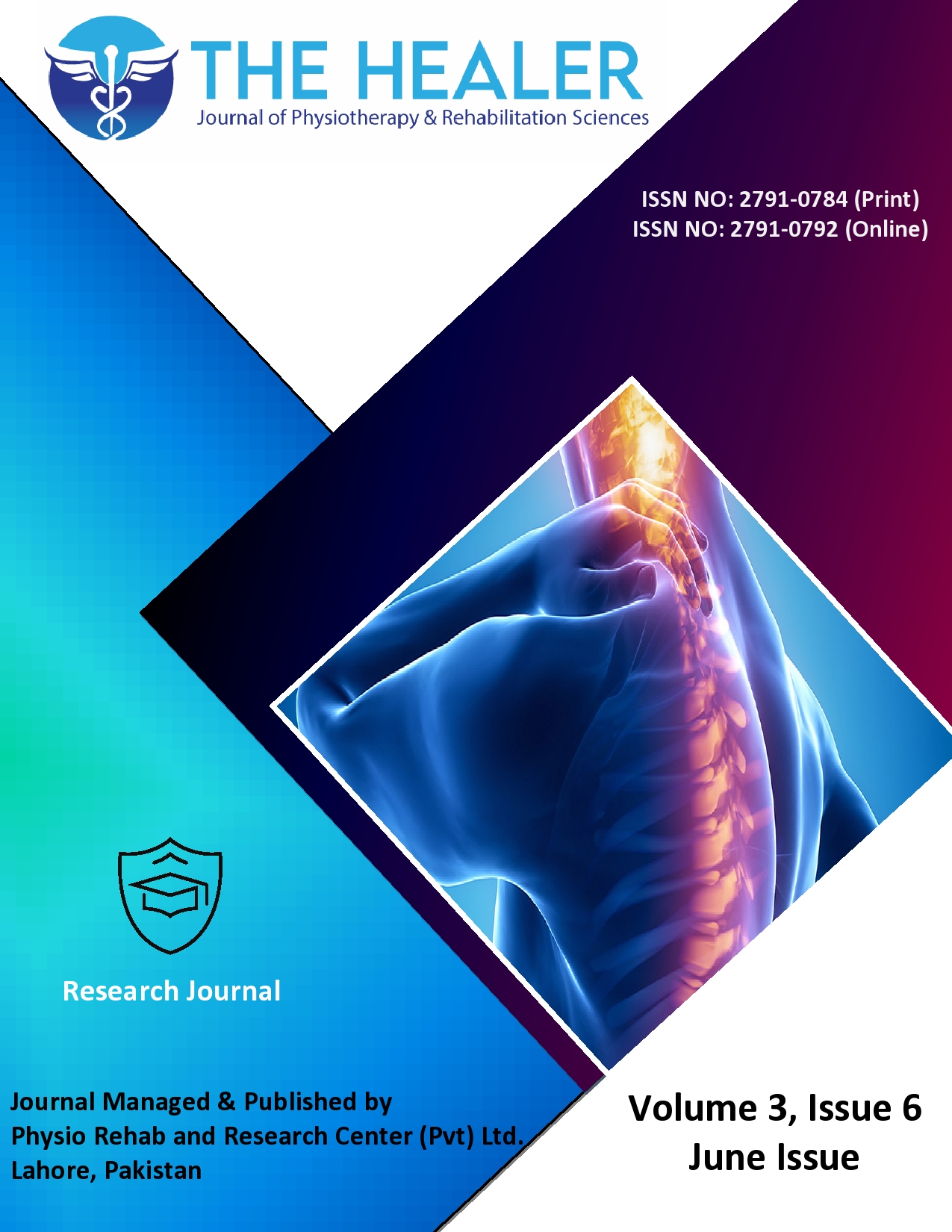Association of High Heels with Pain, Foot Disability and Quality of Life among Women of Pakistan
Association of Heel Pain in Women
DOI:
https://doi.org/10.55735/hjprs.v3i6.127Keywords:
association, foot disability, heel height, quality of lifeAbstract
Background: A large number of women are interested in wearing high heels to look attractive but it also places certain demands on the foot and ankle that leads to problems associated with their well-being and especially in elderly women. Objective: To determine the association of high heels with foot and ankle pain, disability and quality of life among women of Pakistan. Methods: This is a cross-sectional study that recruited two hundred and seven females wearing high heels from Lahore, Pakistan. The time duration of this study was six months after the approval of the synopsis. The females aged between 18 to 50 years wearing high heel shoes were included in the study. The foot and ankle disability index, the numeric pain rating scale and the EuroQol five-dimension healthcare questionnaire were used to measure the outcomes like disability of foot and ankle, foot pain and quality of life in women. A self-customized questionnaire was used to acquire the data related to the duration and frequency of wearing high heels. The association between different variables was calculated using Pearson’s correlation. Results: The average score of the foot and ankle disability index was 69.8. Pearson’s correlation between the height of heels and the foot and ankle disability Index score was reported to be -0.207 while the p-value was 0.002 showing a significant correlation. The average pain score was 3.52 on the pain numeric rating scale. The p-value was 0.002 and Pearson’s correlation between the height of the heel and pain showed a direct and significant correlation (p=0.206). The average score of quality of life was found to be 7.88 showing an indirect and significant correlation as the R-value was found to be -0.121. Conclusion: This present study concludes that there is a direct and significant correlation between the height of heels worn by women and pain in their heels, ankles and feet. It also shows that there is an inverse and significant correlation between the heel height and the foot and ankle disability index score while there is a direct and non-significant correlation between the heel height and quality of life score.
References
Nussbaum MC. Frontiers of justice: Disability, nationality, species membership: Belknap Press Cambridge, MA; 2006.
Au EYL, Goonetilleke RS. A qualitative study on the comfort and fit of ladies’ dress shoes. Applied ergonomics 2007; 38(6): 687-96.
Linder M, Saltzman CL. A history of medical scientists on high heels. International Journal of Health Services 1998; 28(2): 201-25.
Franklin ME, Chenier TC, Brauninger L, Cook H, Harris S. Effect of positive heel inclination on posture. Journal of Orthopaedic & Sports Physical Therapy 1995; 21(2): 94-9.
Masao FT, Ichumbaki EB, Cherin M, et al. New footprints from Laetoli (Tanzania) provide evidence for marked body size variation in early hominins. Elife 2016; 5: e19568.
Lee C-M, Jeong E-H, Freivalds A. Biomechanical effects of wearing high-heeled shoes. International journal of industrial ergonomics 2001; 28(6): 321-6.
Barnish MS, Barnish J. High-heeled shoes and musculoskeletal injuries: a narrative systematic review. BMJ open 2016; 6(1): e010053.
Basha FYS, Devi RG, Priya AJ. A survey on comparative effects of wearing high heels among long-term and short-term users. Drug Invention Today 2018; 10(11).
Kaufman KR, Brodine SK, Shaffer RA, Johnson CW, Cullison TR. The effect of foot structure and range of motion on musculoskeletal overuse injuries. The American journal of sports medicine 1999; 27(5): 585-93.
Breward C. The culture of fashion: Manchester University Press; 1995.
Pemani PO, Massie JD. The effect of personal factors on consumer purchase decision (Case study: Everbest Shoes). Jurnal EMBA: Jurnal Riset Ekonomi, Manajemen, Bisnis dan Akuntansi 2017; 5(1).
López DL, González LC, Iglesias MEL, et al. Quality of life impact related to foot health in a sample of older people with hallux valgus. Aging and disease 2016; 7(1): 45.
Henderson PD, Piazza S. A biomechanical evaluation of standing in high-heeled shoes. Penn State McNair J 2004; 11: 25-38.
Farndon L, Concannon M, Stephenson J. A survey to investigate the association of pain, foot disability and quality of life with corns. Journal of foot and ankle research 2015; 8(1): 1-7.
Hale SA, Hertel J. Reliability and sensitivity of the Foot and Ankle Disability Index in subjects with chronic ankle instability. Journal of athletic training 2005; 40(1): 35.
Call SA. The Foot and Ankle Disability Index (FADI).
Balestroni G, Bertolotti G. EuroQol-5D (EQ-5D): an instrument for measuring quality of life. Monaldi Archives for Chest Disease 2012; 78(3).
Crichton N. Visual analogue scale (VAS). J Clin Nurs 2001; 10(5): 706-6.
Hawker GA, Mian S, Kendzerska T, French M. Measures of adult pain: Visual analog scale for pain (vas pain), numeric rating scale for pain (nrs pain), mcgill pain questionnaire (mpq), short‐form mcgill pain questionnaire (sf‐mpq), chronic pain grade scale (cpgs), short form‐36 bodily pain scale (sf‐36 bps), and measure of intermittent and constant osteoarthritis pain (icoap). Arthritis care & research 2011; 63(S11): S240-S52.
Revel ME, Listrat VM, Chevalier XJ, et al. Facet joint block for low back pain: identifying predictors of a good response. Archives of physical medicine and rehabilitation 1992; 73(9): 824-8.
Baxter DE, Pfeffer GB. Treatment of chronic heel pain by surgical release of the first branch of the lateral plantar nerve. Clinical Orthopaedics and Related Research (1976-2007) 1992; 279: 229-36.
Opila KA, Wagner SS, Schiowitz S, Chen J. Postural alignment in barefoot and high-heeled stance. Spine 1988; 13(5): 542-7.
Ebbeling CJ, Hamill J, Crussemeyer JA. Lower extremity mechanics and energy cost of walking in high-heeled shoes. Journal of Orthopaedic & Sports Physical Therapy 1994; 19(4): 190-6.
Gollnick PD, Tipton CM, Karpovich PV. Electrogoniometric study of walking on high heels. Research Quarterly American Association for Health, Physical Education and Recreation 1964; 35(3): 370-8.
Albert S. Soft-tissue causes of metatarsalgia. Clinics in podiatric medicine and surgery 1990; 7(4): 579-95.
Hong W-H, Lee Y-H, Chen H-C, Pei Y-C, Wu C-Y. Influence of heel height and shoe insert on comfort perception and biomechanical performance of young female adults during walking. Foot & ankle international 2005; 26(12): 1042-8.
McBride ID, Wyss UP, Cooke T, Murphy L, Phillips J, Olney SJ. First metatarsophalangeal joint reaction forces during high-heel gait. Foot & ankle 1991; 11(5): 282-8.
Nyska M, McCabe C, Linge K, Klenerman L. Plantar foot pressures during treadmill walking with high-heel and low-heel shoes. Foot & ankle international 1996; 17(11): 662-6.
Hazekamp MG, Koolbergen DR, Kersten J, Peper J, de Mol B, König-Jung A. Pediatric tracheal reconstruction with pericardial patch and strips of autologous cartilage. European journal of cardio-thoracic surgery 2009; 36(2): 344-51.
Gudipati S, Orth ABF. International Foot & Ankle Foundation.
Russell BS, Muhlenkamp KA, Hoiriis KT, DeSimone CM. Measurement of lumbar lordosis in static standing posture with and without high-heeled shoes. Journal of chiropractic medicine 2012; 11(3): 145-53.
de Oliveira Pezzan PA, João SMA, Ribeiro AP, Manfio EF. Postural assessment of lumbar lordosis and pelvic alignment angles in adolescent users and nonusers of high-heeled shoes. Journal of manipulative and physiological therapeutics 2011; 34(9): 614-21.
Russell BS. The effect of high-heeled shoes on lumbar lordosis: a narrative review and discussion of the disconnect between Internet content and peer-reviewed literature. Journal of chiropractic medicine 2010; 9(4): 166-73.
Afzal F, Manzoor S. Prolong wearing of high heeled shoes can cause low back pain. J Nov Physiother 2017; 7(356): 2.

Downloads
Published
How to Cite
License
Copyright (c) 2023 The Healer Journal of Physiotherapy and Rehabilitation Sciences

This work is licensed under a Creative Commons Attribution 4.0 International License.
CC BY











